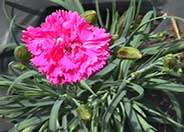
Common name:Rozanne Cranesbil
Botanical name:Geranium 'Rozanne'
Roazanne is a beautiful perennial display addition. The palmately lobed and toothed deep green leaves are accented by clusters of 1.5" pure blue flowers that bloom from June to July.

Common name:Carnation, Clove Pink, Pinks
Botanical name:Dianthus caryophyllus
Dianthus caryophyllus is a perennial. Produces double flowers, bluish green leaves, and leafy stems that often become woody at the base.

Common name:Oriental Fountain Grass
Botanical name:Pennisetum orientale
Oriental Fountain Grass is a clumping warm-season grass with spectacular pink flowers.

Common name:Rock Purslane
Botanical name:Calandrinia grandiflora
This perennial will grow 12-36" and produces large blue/green rosettes that last for a long season. It produces large, silky, lavender/pink flowers that have lime/green, purple spotted calyces.

Common name:Dropmore Catmint
Botanical name:Nepeta X faassenii 'Dropmore'
Dropmore Catmint has soft, grey-green, fragrant foliage that reaches 1'-3' tall, spreading 3'-4' wide. The small leaves are not attractive to cats but bees and butterflies love this plant. This perennial has lavender blue flowers from spring through fall (may depend on heat). Catmint can be planted in sun or part shade in warm inland valleys with well draining, sandy, dry soil. It tolerates coastal conditions. It is drought tolerant once it's established. Prune spent flowers to encourage more blooms. Flowers are fragrant and great for flower arrangements. It is deer and rabbit resistant.

Common name:Delta Fusion Crapemyrtle
Botanical name:Lagerstroemia indica 'Delta Fusion'
Delta Fusion has the perfect combination of dark burgundy foliage and re-blooming hot pink blooms. This small tree or hedge (8-12') is an excellent low water choice. Foliage color does not fade in hot summer sun. Deciduous. Attracts pollinators, summer and fall blooming, heat tolerance, longer blooming, reblooming. Great for an accent, cottage style or informal, hedge, mass planting and privacy planting. Established plants need low water. It does best in full sun with well draining soil. Use slow-growth fertilizer in late winter, before spring growth. Prune to desired shape and size in late winter.
Designer: Susan Morrison
Photographer: Vicki Anderson
Physical weed control, including mulching, or hand removal protects the watershed from harmful chemicals.
Remove irrigation water and fertilizer from areas where you don't want weeds to grow.